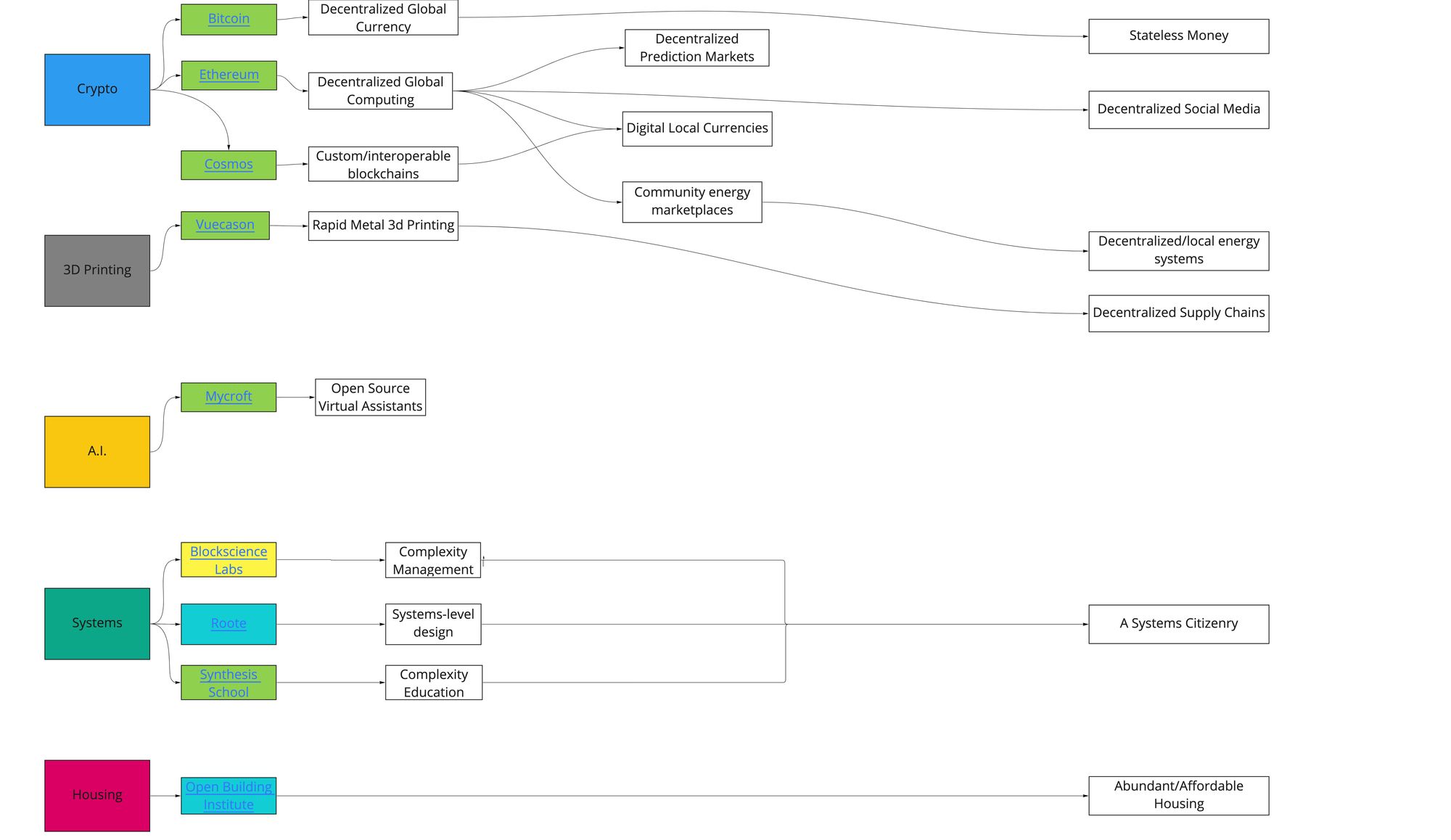I love Balaji Srinivasans’s idea of using a tech tree as a "constantly updated open source map of everything you want to fund, how it interrelates, and what remains to be built. A vision of the definite future that still accommodates uncertainty and creativity."
So I'm building my own.
Don’t build moats, build tech trees
— Elon Musk (@elonmusk) June 14, 2022
This post will explain:
- How to read my tech tree (click here to view it)
- Why I invest
- Why my tree prioritizes decentralization, open source, and a "systems citizenry"
- My goals for version 2.0 of the tree
Reading My Tech Tree

Industries and themes (Crypto, A.I, 3D printing etc.) are on the far left. These themes feed into companies and cryptonetworks. Companies and cryptonetworks produce products, platforms, and applications which facilitate long-term desired social outcomes on the far right.
Green boxes represent investments in startups, teal boxes represent donations to nonprofits, yellow boxes represent pending investments that haven't been finalized.
Why I Invest
I invest to help materialize the large-scale social changes I want to happen. I invest to support teams and projects that are aligned with my values and vision for the future.
I invest in non-profits because markets aren't suited for solving all of our society’s problems. Organizations that optimize for social outcomes rather than financial profits are important, too.
Investing is not my primary focus right now, it's simply something I choose to do with spare financial capital.
Why Decentralization Matters
Stafford Beer, a pioneer in the world of cybernetics and operational research, had wise words on the topic of decentralization.
“The polarity between centralization and decentralization—one masquerading as oppression and the other as freedom—is a myth.”- (Fanfare for Freedom)
“No viable organism is either centralized or decentralized. It is both things at once, in different dimensions."- (Cybernetics and Management)
Unfortunately, because of the hype and naive idealism associated with the crypto/web3 industry, many assume that anyone interested in decentralization believes a future with leaderless communities and no centralization will magically lead to utopia. That everything needs to be put on a blockchain.
This is not my position. I’ve been actively seeking areas where excessive centralization creates problems, and conscious decentralization offers specific social benefits. I believe Web3 projects should adopt a careful playbook of progressively decentralizing towards sufficient decentralization.
“ 'Decentralization,’ as it was originally applied to the world of cryptography and blockchain technology, stuck closely to the dictionary definition of the word: “To undergo redistribution or dispersal away from a central location or authority.” – Reclaiming the Term 'Decentralization'
Here are some of the reasons why centralization concerns me.
1. Centralized physical infrastructure creates existential risks.
Decentralizing supply chains, by ensuring that the failure or actions of a single organization or country won’t disrupt them, will make them more resilient. A more decentralized power system that makes use of microgrids can help ensure communities maintain constant access to energy.
2. Centralized online platforms of all types (search, social media, e-commerce) stifle innovation because they are incentivized to do so.
Decentralized protocols and platforms can offer the functionality we've come to rely on but in a more competitive ecosystem that gives entrepreneurs more freedom to create, and users more choices for migration to alternatives.
3. Centralized social networks disrupt the flow of valuable information by censoring or “downgrading” information they don’t approve of.
“Science” is often used as cover for political decisions. Decentralized social media can offer greater freedom of speech and ensure people have access to important information.
4. Centralized banking restricts economic freedom.
Decentralized cryptocurrencies offer competition in the market for money, and opportunities for peaceful exit for those who don't want to depend on money provided by central banks.
5. Centralized payment networks restrict financial freedom.
Decentralized protocols for payments and financial infrastructure offer security for those who are being de-platformed or simply not served by legacy payment systems.
Why Open Source Matters
I believe we need to open source as much of our socio-technical infrastructure (software and hardware) as possible. Open source facilitates transparency, collaboration, access to information, and rapid innovation.
Embracing and promoting these qualities in infrastructure will help us build a society with more trust, resiliency, and opportunity for growth.
Linux, Bitcoin, and Ethereum are shining examples of open source’s power to transform society for the better.
Why We Need a Systems Citizenry
The universe is a system of systems. Everything we observe and interact with can be understood as a system.
Systems thinking empowers people to understand the fundamental nature of the world and become effective problem solvers in any domain.
Systems science is especially valuable to me because it can provide standardized formal methodologies to complement intuitive and informal systems thinking. It can help society obtain greater interdisciplinary understanding, better mechanisms for threat detection and adaptation, and improved methods for designing and managing complex systems.
The more systems thinkers and systems scientists we can create and empower, the greater our chances of tackling the complex multi-disciplinary problems facing our species.
Tech Tree Version 2.0
This first iteration of my tech tree leaves much to be desired. I’ll be refining it to include:
- Better design. If you know of a good designer I could hire that would want to work on this, please reach out!
- Greater clarity around how products and applications relate to long-term outcomes
- Links to pages that give more information about each node in the tree
- Information about ideas I’d like to fund in the future
I’d love feedback, so please reach out if you have any thoughts or questions.
